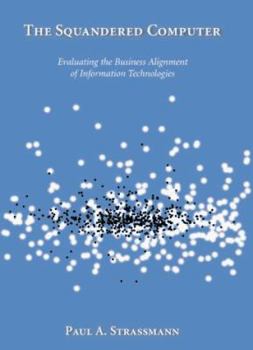The Squandered Computer: Evaluating the Business Alignment of Information Technologies
Overview Despite much talk about the cyber economy, information age, or the knowledge-based enterprise, as yet there are no generally accepted economic or financial principles to guide executives in... This description may be from another edition of this product.
Format:Hardcover
Language:English
ISBN:0962041319
ISBN13:9780962041310
Release Date:April 1997
Publisher:Infomation Economic Press
Length:426 Pages
Weight:2.15 lbs.
Customer Reviews
4 ratings
A Must-Read for CEOs
Published by Thriftbooks.com User , 22 years ago
Wow. And all this time I thought I was nuts. If you're in the IT profession, DO NOT bring this book to work. In many organizations, you would be shot without hesitation for even quoting from this book. "50% of all IT spending is crap, you just don't know which half." This book should be required reading for upper level managers, especially those involved in any aspect of the IT budgeting process. While the material is a bit dry, the information is presented well. What's contained in this book could help you avoid thousands in needless IT spending.
Don't waste IT! anymore
Published by Thriftbooks.com User , 23 years ago
Hello,This book hits the nail on the head. How come so much innovation, technology and inspiration has been so sorely misused? The answers all here, together with quite a few remedies.This is straight and hard talk about putting IT in its place and then putting it to work for the business.This is the book that every CEO should read and every CIO take heed of. It's wonderfully unassuming, forthright and uncompromising.Get it before IT gets you.Regards,Martyn R Jones
Deserves careful study--a powerful message about technology
Published by Thriftbooks.com User , 25 years ago
The main targets for Paul Strassmann's unmasking of misconceptions about the business use of computers include the Gartner Group, advocates of Best Practices, and that mouth piece of computing vendors, the computing trade press (e.g., CIO Magazine). While not a particularly angry polemic, Strassmann is all the more devastating for his understated, simple, and straight-forward marshaling of basic facts. The Gartner group is making a fortune telling executives in various industries what per cent of revenue for a particular vertical industry should be spent on their firms computing function in order to remain profitable. For example, insurance spends a relatively high per cent of revenue, whereas manufacturing is less. Retail is in the middle. In industry after industry, Strassmann demonstrates there is no correlation in spending on computers and profitability. None. That is the meaning of the random scatter diagram which graces the front cover of this book. Some profitable companies spend a large per cent, others spend a significantly smaller per cent. Some losing firms spend a large per cent, others spend a smaller one. This is regardless of what measure of profitability is used (return on assets, return on net investments, or economic value-added (Strassmann's favorite)). Note this result, while surprising, is consistent with computers making decisive contributions to efficiency, competitive viability, and value creation. One of Strassmann's databases collects facts that warrant a sobering conclusion. Over half the nominees of popular magazine excellence awards are likely to be losers in economic value within three years of scoring well on somebody's checklist of best practices (p. 137). Strassmann unmasks CIO Magazine's "Enterprise Value Awards" as attributing to computerization gains made by improving basic business and management practices. When the single most profitable industry recorded a return on equity of about 35 % (1996), what are claims of 14,000% and 600% supposed to mean? Such astronomical claims are a disservice to information systems managers and to the computer industry as event subsequently demonstrated at the selected companies (pp. 170-171). The trade press rely on survey data about IT spending gathered by main-in questionnaires or telephone surveys (p. 107). Is that what you want to rely on? Instead of INFORMATION WEEK "Excellence Awards" a better method would be to interview customers who have defected to the competition. Instead of treating computers as a capital asset, rather evaluate what effective management can accomplish with the cooperation of knowledge workers equipped with computers. Naturally, this puts responsibility squarely where it belongs. One particularly Strassmannesque idea is that software is (or ought to be) the repository of knowledge capital about a business and its processes. If well-designed -- a large IF -- software is virtually immort
Excellent reference for those researching "Value of IT"
Published by Thriftbooks.com User , 25 years ago
I found the book very well organized and not afraid to challenge the established ways of measuring IT Value to the business. Anyone who is searching for options and alternatives to measuring IT projects and infrastructure will gain many new insights. A must for the CIO bookshelf.





